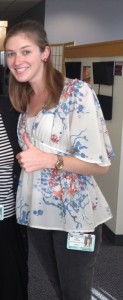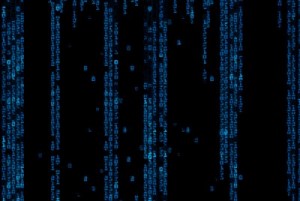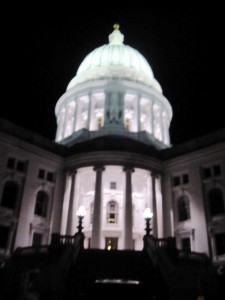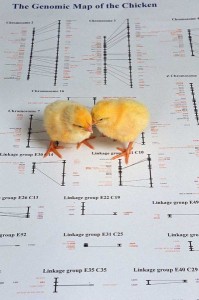Disclaimer: Speaking for myself as an individual in this post, not on behalf of my employer.
There is a lot to be gained from stepping out from behind your desk once in awhile. I work in the Dana-Farber Cancer Institute’s Division of Development and the Jimmy Fund. Our offices are down the road from the main Institute campus, which is a comprehensive cancer center. I’m fortunate that my responsibilities bring me to the main campus often, but many of my colleagues do not get such opportunities. To help keep our entire division connected to the Institute, every year we have a shadow day where the people who work to raise money to support the Institute get to shadow someone who works in a different role at the Institute for a morning.

Thumbs up for having a job you enjoy.
The shadow assignments can be anything– in the past, I’ve shadowed researchers and the leader of Dana-Farber’s gift shop. Other people have followed members of the community benefits program, patient resources, maintenance, etc. This year I had the opportunity to shadow a clinician as they saw patients.
It is such an intimate experience to sit in on someone’s appointment with their physician. To squeeze into the room with the patient and their family and listen as they detail their concerns and thoughts, looking for guidance and help. I was grateful (and somewhat shocked really) that so many patients welcomed my partner-for-the-day and me into their appointments. I’m not sure that, in their shoes, I could have been so gracious.
The patients’ graciousness was noteworthy, in part because these were cancer patients: people touched by one of humanity’s most daunting adversaries. Their uncertainty resonated and found uncertainty in me. Sure, I do know a bit about being a patient, but not a cancer patient. I know about cancer research, but from an outsider perspective–not that of physician or patient. This peering into a patient appointment was something new. I knew enough science and medicine to keep up with the conversation, and enough to be able to empathize with the patients, but truly it was an eye-opening experience.
In a morning of novel things, a few stood out to me. One was how quickly the physician was expected to switch from topic to topic. In the in-between moments when we weren’t in the examination rooms with the patients, the doctors darted around the hallways, conferring with the nurses here, with the radiologist reading the patient’s scans there, updating patient records, consulting notes,writing notes, or placing calls to other physicians. There really never was a “down” moment in the four hours that we were there.
For one of the patients that day, the nurse and the physician had different plans for how they intended to handle the patient’s unique situation (another disease on top of their cancer), and they had to devise a single game plan. Knowing Dana-Farber it was perhaps not surprising to see that all voices from the care team got heard, but it was still refreshing to witness.
Something else that struck me about the experience is actually a lesson I learned myself during my own health scare: while physicians are the experts, you need to keep track of your care plan and participate actively. Often patients or their families know more details and the context of the situation than the physician may remember off-hand, especially when the physician sees a lot of patients with similar diagnoses. The task-hopping required of these clinicians makes it impossible to remember all of the things you’ve discussed in prior appointments exactly without prompting sometimes. It’s not imprudent to jog their memory or ask them if they’re sure about something. You can and should question your doctors; if something doesn’t seem right to you, just be reasonable. Listen to their expertise, trust their evidence, but still make sure you’re bringing up your concerns.
It was also particularly interesting how quickly the physician had to change their approach as they went from patient to patient. The patients we saw that morning ran the gamut, and each was in a different stage of their cancer experience. There was optimism of a promising diagnosis alongside terminal cases where nothing else could be done. There were chronic patients and patients for whom the cancer was not their primary health concern. It was fascinating to watch the physician read the room and get a sense of how the patient and their family members were feeling and try to meet them where they were. As with all things, I think there were hits and misses, but, for the most part the personalization of each appointment was a really positive thing.
For me, because I write about forthcoming solutions in the form of therapies, it really felt like I was getting a sense of the meaning of the work. This is what it’s all about: trying to help the people that come for care. I write often about the type of cancer that the patients we saw actually have, so I’m very familiar with the drugs. It was striking to see patients feeling good on some of the newer medications, even in cases where they weren’t going to be cured and they knew it. Having a good quality of life in the time they have is really significant. You do the best you can with each unique situation, but to at least be able to offer patients the chance to feel better even if you’re not getting them that much more time still felt like a win of sorts. Maybe not the ultimate win, but not a dismal failure either.
I’m extremely grateful to have had the chance to see just a snippet of the work that Dana-Farber researchers and clinicians do. In development, it can sometimes feel like we’re not actually involved in what Dana-Farber does, because we’re just raising the money. The shadow day experience helped me to feel more connected to the fact that everything we do is about helping patients. It was a good reminder of why I chose to work in a non-profit and what drew me to this kind of science writing in the first place. I wanted to be an advocate and an ambassador for science, for a cause, and I can’t think of a better one than this.



